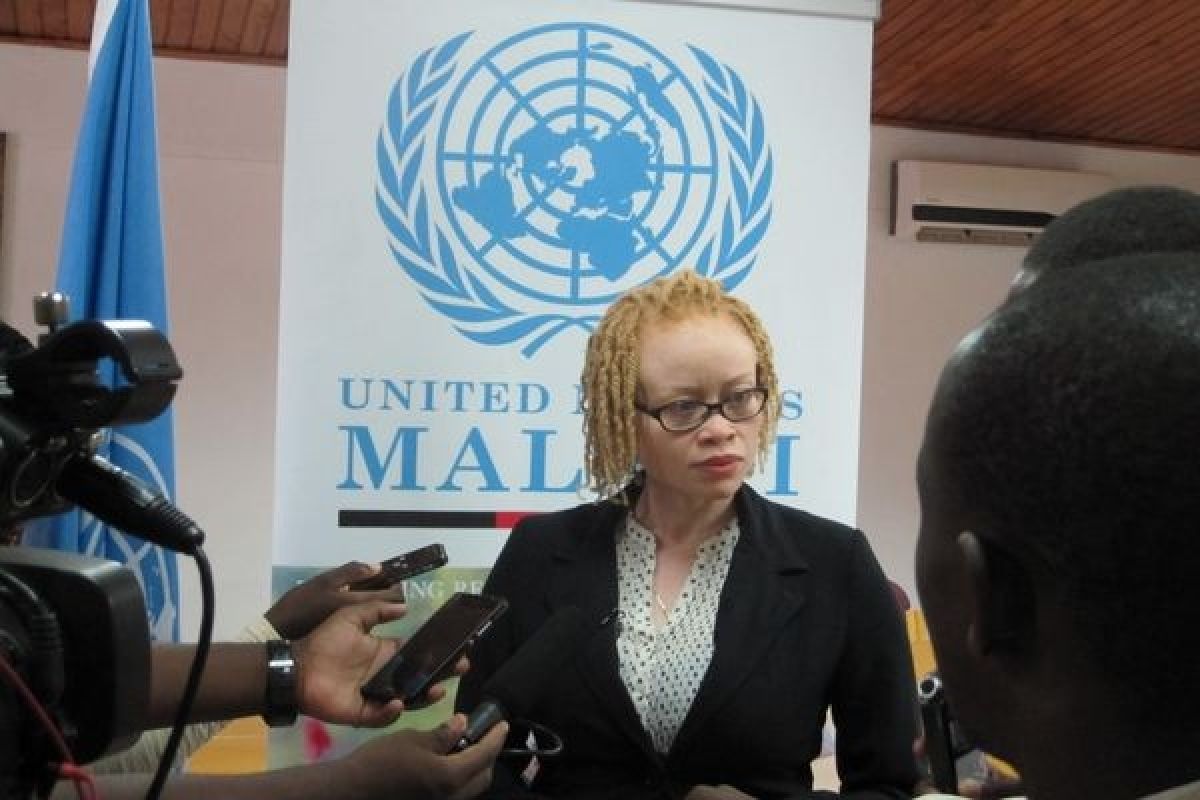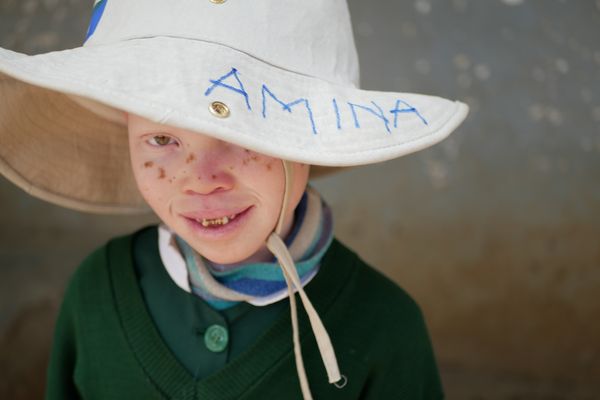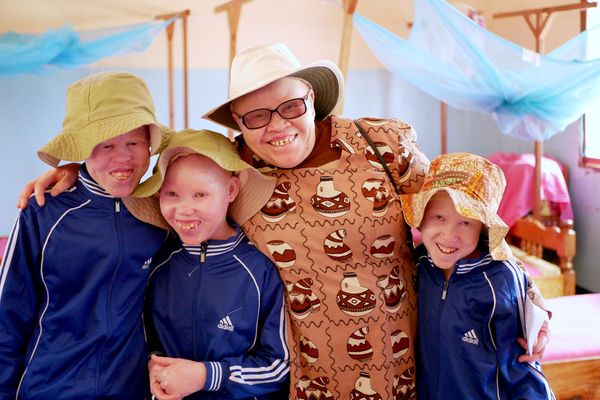
Charities are warning of an increase in incidences, as people impoverished by lockdowns turn to witch doctors for help. By Miriam Mannak.
The number of violent attacks and murders against people with albinism has increased since the Covid-19 pandemic, activists have warned.
In the past six months alone, there have been recorded attacks in Tanzania, Malawi, Mozambique, the Democratic Republic of the Congo (DRC), Zambia, Burundi, Gabon, Namibia and Madagascar.
In March, the president of the Malawi-based Association of People with Albinism (APAM) challenged the Malawian government to expose the market in body parts and protect people with albinism.
It followed a gruesome incident in February in which graverobbers chopped the arms and legs off a body interred near Blantyre.
Reasons for the apparent increase in incidents since March 2020 include rising unemployment rates, poverty, and hunger, which groups like APAM believe have resulted in people seeking good luck remedies from witch doctors.
In countries like Malawi, Tanzania and Zambia, some people believe the body parts and hair of people living with the rare pigmentation condition can bring good fortune.
‘Despite improvements in protecting people with albinism, I am deeply saddened by the apparent rise in murders and attacks since the start of the pandemic,’ said Ikponwosa Ero, who was the first UN independent expert on the enjoyment of human rights by persons with albinism, and herself lives with the genetic condition.
One of Ero’s theories is that many communities have sunk deeper into poverty since the start of the pandemic, and, desperate to survive, some have turned to black magic.
‘In times of crisis, the use of ritualistic practices always increases,’ she explained.

Above: A child with albinism.
Blamed for the pandemic
What's more, in some communities, people with albinism are being blamed for the pandemic, according to the NGO Standing Voice.
‘We’ve received disturbing reports of people with albinism being called ‘corona’ and blamed for the outbreak of this ‘foreign’ virus,’ said its head of communication and fundraising, Sam Clarke.
Amnesty International is also concerned about the attacks.
Between November 2020 and early February 2021, the human rights organisation registered at least seven murders and kidnappings of people with albinism in Malawi alone.
Zambia, too, is a country of concern. In July 2021, a group of men attacked and mutilated a nine-year-old boy, and a month before that, three fake police officers broke into the home of a two-year-old and her mother.
Local media reported that while the woman was being held in the living room, a man went to the bedroom and cut off the little girl’s hand.
She barely survived.
‘It is gruesome, and to think I’ve seen pictures that are even more horrific’ said the 30-year-old Ero, who hails from Nigeria.
Smuggling children with albinism
Meanwhile, in Tanzania, the police are investigating the murder of a boy of about five years old in May 2021.
The child was attacked, mutilated, murdered, and dumped in the bush. What makes this particular investigation difficult is that no one has recognised the boy.
‘It may be so that the child is from another country and was smuggled into Tanzania,’ said Ero, noting that the increased risk of violence is making life for people with albinism more complicated than it already is.
This is especially true for children.
Ero recalled how her childhood was tough. What was normal for her peers, playing outside, for instance, or going to the shop to run an errand, was painful for the human rights lawyer.
'Is it really necessary? That was always the biggest question before I went outside. A walk from home to the local shop would result in teasing and jeering,’ she recalled, noting some shop owners would do their best not to touch her fingers when exchanging money for the purchases.
Ero was often beaten in class because she couldn’t read what was written on the blackboard.
She explained that it was not because she was illiterate but because of her poor eyesight – poor vision is a common ailment of people with albinism.
‘It was very difficult. As a child, you don’t understand why people hate you so much.’

People with albinism are often ostracised by society - or worse.
Less access to healthcare
Having little to no melanin in the skin and eyes, gives fairer-skinned people a much higher risk of severe sunburns, skin cancer, eye problems, and other issues.
This is especially true for people with albinism.
What's more, due to discrimination, many men and women with albinism are less likely to find a job and are thus more prone to living a life in poverty.
This makes simple things like sunscreen unaffordable, let alone skin cancer treatment, said Sister Martha Mganga, an Anglican nun from Tanzania, herself living with albinism.
'One bottle of sunscreen with an SPF of 50 can cost 50,000 Tanzanian shillings ($20),’ said the nun, who has undergone over 10 skin cancer surgeries.
To make it easier for people like her, especially children, she started Albinism Peacemakers in 1986.
The organisation takes care of 125 boys and girls between the ages of five and 19 by placing them in selected schools and boarding schools where they can be who they are.
'Here, their special needs are catered for, including access to protective clothing, hats and sunscreen,' Mganga said, noting Albinism Peacemakers has a mobile clinic that goes into communities and provides free skin check-ups.
Pressure from civil society
Amnesty International acknowledges the problems the lockdowns are causing people with albinism.
‘Governments across southern Africa must pay special attention to persons with albinism who are being left further behind in the wake of lockdown measures to curb the virus,’ said Tigere Chagutah, Amnesty International’s deputy director for southern Africa.
‘We know marginalised groups have greater difficulty exercising their human rights, including accessing healthcare and livelihoods, in normal times. They are so much more vulnerable during a pandemic.’
Authorities must ensure that measures to respond to Covid-19 are inclusive of the specific needs of persons with albinism, Chagutah continued.
‘These include the provision of sunscreen lotions, enabling access to information, increasing community policing and improving access to social protection to maintain their health, safety, dignity, and independence during and post the Covid-19 pandemic.’
Less donor funding due to lockdowns
Adding insult to injury, many donors have redirected their funds to Covid-19 interventions like testing, masks and vaccines, leaving NGOs with fewer funds to help people with albinism.
Ero said this makes them less capable of handing out sunscreen, sunglasses, and other things and rendering life-saving interventions. ‘We are receiving weekly messages from people who have died of skin cancer, even though the disease is completely preventable.’
That doesn’t mean there is no good news. Kenya, for instance, has implemented stricter laws to protect people with albinism.
‘Kenya is one of the most progressive countries as it makes budget money available to protect the well-being of this group,’ Ero said.
‘The country has also appointed someone within the government, dedicated to people like me. This is very impressive as no other country is doing this.’
Meanwhile, in recent months Standing Voice has ramped its Skin Cancer Prevention Programme, which is currently helping over 7,000 people with albinism in Tanzania and Malawi, and is the largest of its kind in the world.
The facts on albinism in Africa
- Albinism is a genetically inherited condition, of which there are several types. The main three ones are oculocutaneous albinism, which affects the eyes, hair and skin, and is the most common type. Other variants include ocular albinism, which affects only the eyes, and Hermansky-Pudlak Syndrome, which affects the eyes, hair, and skin and contributes to bleeding problems.
- Both parents must be carriers of the gene to be passed on to their children, even if they are not affected themselves.
- If both parents carry the recessive gene, there is a 25 per cent chance of a child being born with albinism.
- Approximately 219 people with albinism have been killed since 2006, and 778 human rights violations have been reported across African countries, according to Standing Voice. These numbers could be much more.
- Albinism occurs more in Africa than in Europe. According to the World Health Organization (WHO), the condition affects one in 5,000 to one in 15,000 people in sub-Saharan Africa, compared to one in 20,000 in North America and Europe.
- Prevalence in Tanzania is particularly high and hovers around the one in 1,400-mark. In some communities in Zimbabwe, one in every 1,000 people is affected.
- In Africa, the life expectancy of people with albinism is low due to poor access to and availability of protective clothing and necessities such as cancer detection, diagnostics, and treatment. In East Africa, most people with the condition die by the age of 30 from skin cancer. Only two per cent lives to the age of 40 and beyond, according to the Tanzania-based NGO Asante Mariamu.



